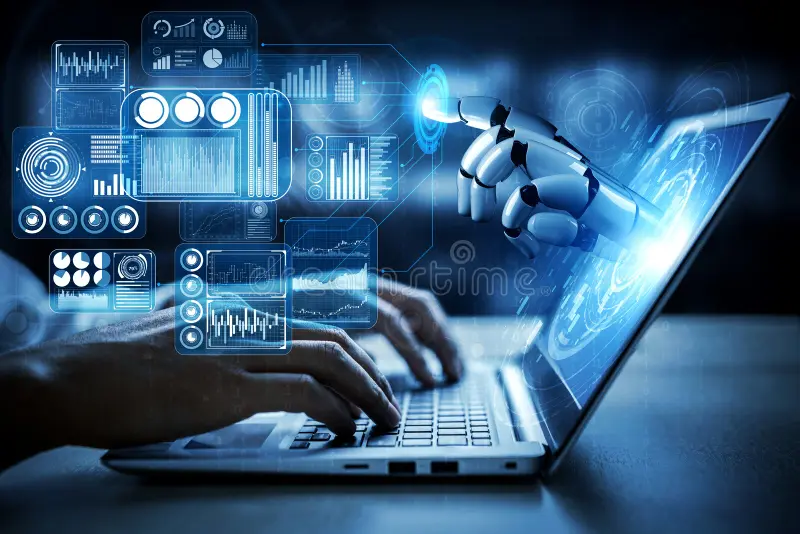The Jaw-Dropping Truth You Need to Know About AI
Artificial Intelligence (AI) is revolutionizing our world, but what does it really mean? Imagine AI as the brainpower behind computers, enabling them to perform tasks that usually require human intelligence. This includes understanding language, recognizing speech, processing images, or making decisions. Picture AI as the magic behind chatbots—like those virtual assistants that understand and respond to you—or systems that can recognize faces in photos and even generate music and art.
Why AI Matters
AI isn’t just a tech trend; it’s transforming our lives in profound ways. In the business world, AI is a game-changer. It handles repetitive tasks, freeing humans to focus on creative and complex problems. Imagine customer service, lead generation, fraud detection, and quality control being managed by AI systems that never tire. This is not science fiction—it’s happening right now.
For businesses, AI acts like a super-powered employee. It’s excellent for tasks requiring the processing of massive amounts of data, like analyzing legal documents or uncovering hidden trends in datasets. This scale of data handling gives businesses an unprecedented edge.
AI is also creating opportunities previously thought impossible. Take Uber, for instance. The seamless connection between riders and drivers through an app was once a far-fetched idea. Now, thanks to AI, Uber is a global powerhouse.
AI in Major Tech Companies
AI is central to the operations of tech giants like Alphabet (Google’s parent company), Apple, Microsoft, and Meta. At Google, AI enhances its search engine’s intelligence, making it smarter and more intuitive. Alphabet’s Waymo project, which focuses on self-driving cars, heavily relies on AI. The Google Brain team’s development of transformer architecture has led to groundbreaking tools like OpenAI’s ChatGPT.
AI’s Impact on Transportation
AI is not only reshaping tech but also revolutionizing transportation. Self-driving cars are a prime example of AI at work, but its influence extends to managing traffic, reducing congestion, and improving road safety. Imagine a future with no traffic jams and smoother, safer journeys—thanks to AI.
In aviation, AI predicts flight delays by analyzing weather forecasts and air traffic patterns, leading to fewer disruptions and a better travel experience. In maritime industries, AI optimizes shipping routes and monitors vessel conditions, making sea travel safer and more efficient.
Augmented Intelligence vs. AI
It’s easy to get caught up in the sci-fi image of AI taking over the world. However, the concept of “augmented intelligence” offers a more realistic perspective. Rather than replacing humans, augmented intelligence enhances our capabilities. For example, AI tools like ChatGPT or Google’s Gemini improve our decision-making by handling specific tasks efficiently.
On the other hand, AGI (Artificial General Intelligence) represents a more ambitious vision—machines that can perform any intellectual task a human can. While this remains a distant dream, it’s important to manage expectations and understand the current capabilities of AI.

Ethical Considerations in AI
With AI’s power comes responsibility. AI systems learn from data, which means they can inherit existing biases, leading to unfair or harmful outcomes. Generative AI, capable of creating realistic text, images, and audio, also raises concerns about misinformation and deepfakes.
Businesses using AI must consider ethics seriously. This includes ensuring transparency, explainability, and fairness in AI systems. For instance, in finance, AI’s “black-box” nature can be problematic when clear explanations for decisions are legally required.
AI Governance and Regulations
As AI becomes more integrated into our lives, regulations are catching up. Currently, AI regulations often focus on specific applications rather than the technology as a whole. The EU’s GDPR sets standards for data privacy, impacting AI’s use.
In the U.S., the National AI Initiative and increased funding for AI research highlight the country’s commitment to staying ahead in AI development. However, other countries like China and India are also heavily investing in AI, intensifying the global competition for AI leadership.
The History of AI
The idea of creating intelligent machines dates back to ancient myths. Greeks imagined Hephaestus creating robot-like servants, and ancient Egyptians built animated statues. Philosophers and mathematicians like Aristotle and Thomas Bayes laid the groundwork for modern AI.
The 20th century saw key developments with Charles Babbage’s Analytical Engine and Alan Turing’s universal machine concept. The 1956 Dartmouth College conference marked AI’s formal beginning, leading to advances like the Lisp programming language.
The 1970s and 80s experienced the first “AI winter” due to unmet expectations, but the development of expert systems revived interest. The 1990s and 2000s saw a shift to machine learning, with breakthroughs like IBM’s Deep Blue. The 2010s ushered in the age of deep learning, driving innovations in image recognition and natural language processing.
The Future of AI
The future of AI is incredibly promising. We can expect advances in natural language processing, computer vision, and robotics. AI will become even more integrated into our daily lives, but challenges like ethical concerns, privacy issues, and job impacts will need addressing.
In the United States, AI will play a crucial role in maintaining technological leadership, supported by government initiatives and research funding. However, global competitors like China and India will continue to drive the race for AI supremacy.
Read More: Actor Siddique Resigns from AMMA Amidst Sexual Misconduct Allegations
Conclusion
AI is more than a buzzword; it’s a transformative force reshaping our world. From self-driving cars to virtual assistants, AI is becoming integral to our lives. As we embrace its benefits, we must also tackle ethical challenges and ensure responsible development for the greater good.







